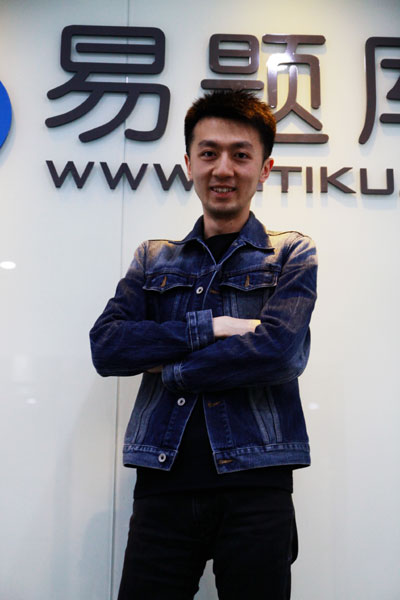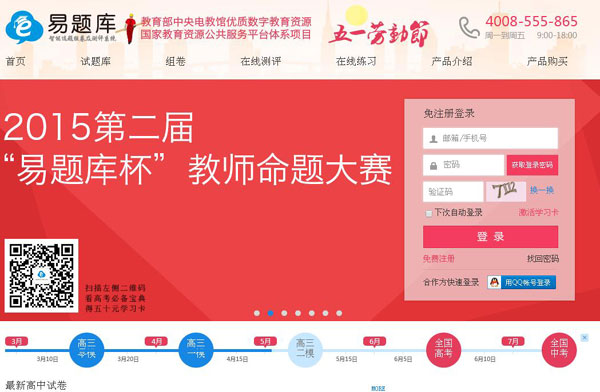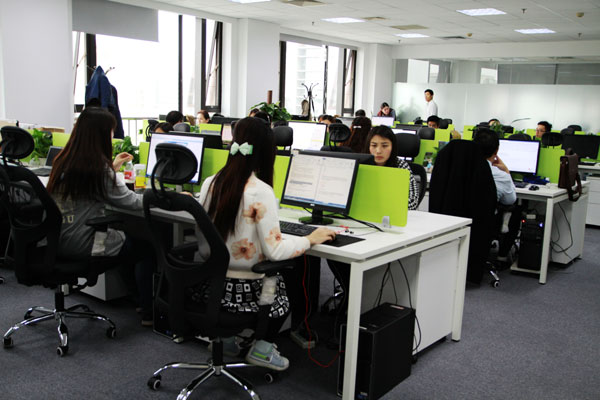Editor's Note: A start-up frenzy has gripped China since Premier Li Keqiang encouraged people to innovate and start their own businesses last March. The country's "post-90s generation" of entrepreneurs — a term describing those born in the 1990s — has come of age. They are bold digital natives brought up in the founding era of Internet giants like Tencent and Alibaba, and unafraid of failure. Products of the Internet, and rapid economic growth and globalization, these young entrepreneurs have their own stories to tell. Wu Xingyu. [Photo by Song Wei/chinadaily.com.cn] A few months after Wu Xingyu was congratulated by teachers for graduating from the university, the 23-year-old has been making his dream of reliving tens of thousands of teachers in China from drowning in marking papers a reality. Yitiku, an online software system based on Wu's idea, eases the workload of teachers by doing many of the functions that they did, such as selecting the test questions, forming an exam paper, evaluating, and preparing exercises for the students. The features of Yitiku may sound quite simple, but this idea won his company millions of dollars in the A round of financing from China's Internet giant Tencent in January. The unexpectedly successful fund raising story became a popular conversation starter among the people in the education business. "I can say it's quite an achievement for me and our company. As far as I know, I'm the first entrepreneur born after 1990s that Tencent has invested in, and we are the first online education company they have invested in," Wu Xingyu, founder and CEO of YISIYIXUE Education Technology Co, Ltd, the developer of Yitiku, told China Daily. Different from other online education companies that treat students as clients, Yitiku has chosen teachers as their focus. "We make the work of teachers easy. Usually it takes two to three hours for them to prepare a new exam paper. Now it's just three clicks," said Wu. He is quite satisfied with the major features of the software. Sitting in his 10-square-meter office in Zhongguancun, a hub of innovation in Beijing, Wu looks confident and chatty when talking about his business. His fast-speed answers give people an impression that he has years of experience in the online education sector. The fact is that he has been putting most of attention in directing courses at an elite art college in the country until about a year ago. But the passion of becoming an entrepreneur has been in Wu's mind since he was an art student. Studying in Beijing Film Academy, Wu often joined his classmates to make short films or photographs for companies and started earning money. The business worked well and some of them started thinking about founding a company in their sophomore year. As good as the idea was, it didn't carry out at the last minute due to different voices inside the group. But the idea of founding his own company grew on Wu. And he also learned his lesson from the unsuccessful experience. "Too many people hardly agree on one thing. And I prefer working with people who are not my age, older with more experience," Wu said. The screenshot of the Yitiku website. It is visibly apparent in his company. Many post-90s entrepreneurs love starting their business with their friends or hiring people who are also born after 90s, while the middle aged are clearly the majorities in Wu's company. In this less than 40 staff company, over 10 employees are experienced teachers focusing on answering and organizing the test questions. An outsourced team with more than a 100 teachers helps checking and writing all the answers from the test papers they've collected — a fundamental data to the system. Wu's idea of building this teacher-centered system relates to his experience in college. Back then, he often went to schools to rent the room or place for shooting and he talked frequently with teachers. He noticed that teachers were tired of preparing test papers for students and spent remarkably large amount of time checking those papers. China is renowned for its exam-oriented education system which is deeply rooted and hard to change in short time. Students have to do large amount of exercises so that they can prepare themselves better for the exams. The tedious work of teachers rang the bell inside Wu's entrepreneur mind. Moreover, the government is starting to favor the combination of traditional education and technology, giving Wu one more reason to focus on online education. Given the boom in online education right now, it may come as a surprise to many, but back in 2010 China brought up the idea of education informatization as the goal for the next decade, which left a hint of the technology-led revolution on the tradition education field. "Over 70 percent functions of our system are designed for teachers because the market for students is already taken. We need to find a more specific market to live on," Wu said. Yitiku offers teachers all functions related to exams. It solves an array of questions the teachers may have by analyzing the test results: what type of questions are the hardest, how many times they have appeared in the exams before, how students perform on the paper, etc. The system is also able to push notifications for the students about the related questions they might have made mistakes in based on previous records. Wu said the system will be further developed to ease the teachers' burden. It will help them to monitor students' response to a course and increase the interaction between them. The Yitiku office in zhongguancun, a hub of innovation in Beijing. [Photo by Song Wei/chinadaily.com.cn] Wu values the data, which is based on teachers and students work, the most. "Data is extremely important." There is a reason for that. An official from the Ministry of Education once admitted their helplessness to Wu. "They cannot evaluate the students' academic performance nationwide since the data is impossible to collect. The nationwide college entrance examination is the only chance we get to know students' academic ability. Before the students turn 18, we are in the dark. All statistics are too narrow…only valid in local exams," he said. It shocked Wu and became the next goal for his company. According to him, the company has been designing a project that can collect all the data from first grade in primary school to senior grade in high school nationwide if it is available countrywide. "The sources from the third party will be a great support for the traditional education we have right now," he added. But the seemingly bright future of Yitiku is being put to test as more players enter the young market, eating the emerging demand. Yitiku is not the only online education company that has succeeded in receiving considerable investment. Genshuixue.com, an O2O platform that connects students with right tutor through Internet, received their A round investment of $50 million in March; Yuantiku, an online smart exam database, landed its $60 million funding for D round in April; 17zuoye.com, an online study platform targeted at Chinese K-12(kindergarten to grade 12) space, announced their $100 million financing for D round in February. The online education industry is excited to receive more than $500 million in total financing in the first quarter. Many entrepreneurs with their business instincts in Internet and education, like Wu, started their journey in the business. Wu has to fight against a long list of more experienced and equally ambitious entrepreneurs who have a deeper pocket. Being asked what are the differences between entrepreneurs who are in their 90s and who are in 80s or even earlier, Wu thinks the younger generation which grew up with the Internet is born with the ability to absorb the different information at the same time in a faster speed than those born in 80s or 70s. "It's like the network's bandwidth. Our (people born in 90s) bandwidth of network is 100M/s, theirs (people born in 80s, 70s) is 10M/s," Wu said.


23-year-old wants to ease workload of teachers
Editor:周倩
Source:中国日报网
Updated:2015-05-04 14:11:52
Source:中国日报网
Updated:2015-05-04 14:11:52
Special
Contact
Welcome to English Channel! Any suggestion, welcome.Tel:0731-82965627
lisl@rednet.cn
zhouqian@rednet.cn











